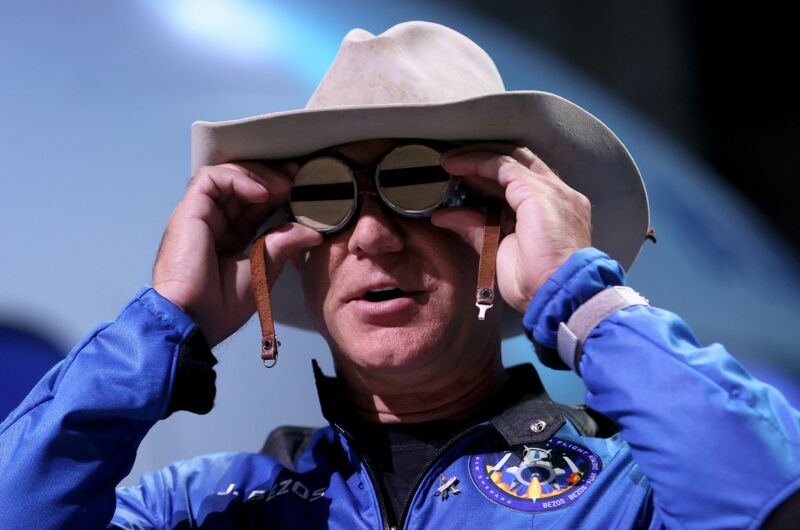
The US Government Accountability Office (GAO) today rejected Blue Origin's attempt to block the lunar-landing contract that NASA awarded to SpaceX. The GAO also rejected a similar protest filed by Dynetics.
NASA in April 2020 selected SpaceX, Blue Origin, and Dynetics to design and build human landing systems. But in April 2021, NASA decided to go only with SpaceX and its Starship vehicle for the Artemis program, which is NASA's plan to return humans to the Moon by 2024.
"The cost of SpaceX's bid was about half that of Dynetics, and one-fourth the amount received by Blue Origin," as our coverage at the time said. While budget was apparently the biggest factor, NASA also "praised the [SpaceX] vehicle's innovative design and future-looking technology that might also one day be used on Mars" and cited Starship advantages including "a spacious cabin for astronauts, two airlocks, and ample payload capability to bring large numbers of experiments to the Moon and return samples to Earth."
“NASA did not violate procurement law”
NASA's choice didn't sit well with Blue Origin, which is owned by Amazon founder Jeff Bezos. Blue Origin filed a protest to the GAO shortly after, claiming that NASA's process and reasoning for selecting SpaceX were flawed. The GAO announced its decision today, finding that NASA didn't violate any laws or regulations.
"NASA made award to SpaceX for a total evaluated price of $2,941,394,557," the GAO said. "After noting that SpaceX submitted the lowest-priced proposal with the highest rating, and that the offers submitted by Blue Origin and Dynetics were significantly higher in price, NASA also concluded that the agency lacked the necessary funding to make more than one award."
Blue Origin and Dynetics "argued that the agency was required to make multiple awards" because it had previously stated a preference for multiple awards, the GAO said in summarizing the companies' complaints. The protesting companies also "alleged that the agency was required to open discussions, amend, or cancel the announcement when NASA, after the receipt of proposals, determined that it had less funding than it needed to support multiple HLS [Human Landing System] awards," the GAO said. The protesters further claimed that "NASA unreasonably evaluated all three of the proposals" and "improperly waived a mandatory solicitation requirement for SpaceX."
The GAO was not convinced by any of the primary arguments, the agency's announcement said:
In denying the protests, GAO first concluded that NASA did not violate procurement law or regulation when it decided to make only one award. NASA's announcement provided that the number of awards the agency would make was subject to the amount of funding available for the program. In addition, the announcement reserved the right to make multiple awards, a single award, or no award at all. In reaching its award decision, NASA concluded that it only had sufficient funding for one contract award. GAO further concluded there was no requirement for NASA to engage in discussions, amend, or cancel the announcement as a result of the amount of funding available for the program. As a result, GAO denied the protest arguments that NASA acted improperly in making a single award to SpaceX.
GAO next concluded that the evaluation of all three proposals was reasonable, and consistent with applicable procurement law, regulation, and the announcement's terms.
The GAO said it agreed with Blue Origin and Dynetics about one "limited discrepancy in the evaluation" in which "NASA waived a requirement of the announcement for SpaceX" but said that the "protesters could not establish any reasonable possibility" that this created a competitive prejudice.
The GAO announcement was a bit vague, and the agency did not release the full decision because it "may contain proprietary" information. A public version will be issued after the companies are given a chance "to promptly identify information that cannot be publicly released."
Blue Origin still mad, but it’s NASA’s decision
The GAO also said that it "expresses no view as to the merits" of each company's proposal, adding that "judgments about which offeror will most successfully meet the government's needs are reserved for the procuring agencies, subject only to statutory and regulatory requirements."
Blue Origin told CNBC that "there were fundamental issues with NASA's decision, but the GAO wasn't able to address them due to their limited jurisdiction." The company also said it will "continue to advocate for two immediate providers" because NASA's "Human Landing System program needs to have competition now instead of later."
SpaceX CEO Elon Musk responded to the GAO decision on Twitter with a flexed-biceps emoji.
NASA issued a statement saying the GAO "decision enables NASA to award the contract that will ultimately result in the first crewed demonstration landing on the surface of the Moon under NASA's Artemis plan... An uncrewed flight of Artemis I is on track for this year and a crewed Artemis II mission is planned for 2023."
reader comments
405